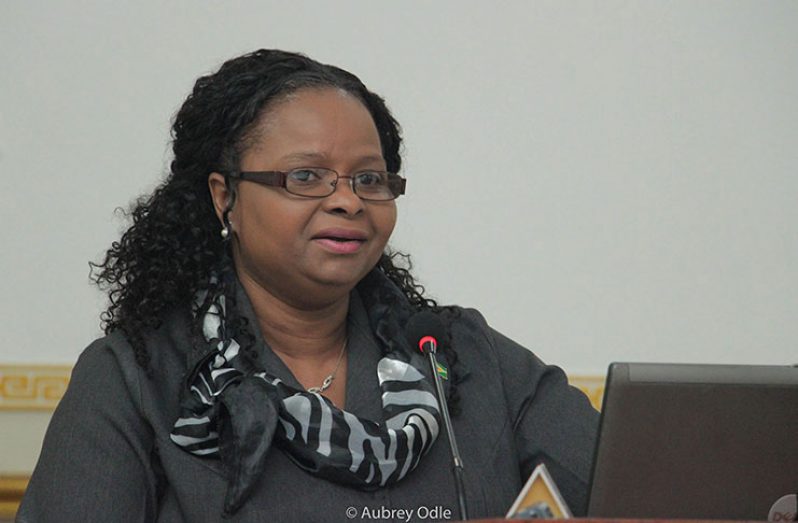– Lawrence urges ahead of historic conference in TT
COUNTER-STRATEGIES are needed to roll back the rising number of Non-Communicable Diseases (NCDs) in the Region, Public Health Minister Volda Lawrence said ahead of the 10th Anniversary of the historic Port-of-Spain Declaration on Non-Communicable Diseases.
Minister Lawrence, in a statement, said the historic event will be held in the twin-island Republic on September 5-6 at a time when regional statistical findings are indicating that future adults are “already suffering from NCDs.”
She said health sector leaders and change agents must pay close attention to the regional findings and craft counter-strategies to roll back diabetes, hypertension (high blood pressure) cardiovascular (heart) diseases, lung and skin cancers, obesity, asthma, cataract, stroke, chronic kidney diseases, liver cirrhosis, appendicitis, narcolepsy, emphysema, anorexia nervosa and arteriosclerosis among other preventable NCDs.
Ten years ago, the Caribbean created global history when it convened the inaugural conference of Heads of Government on NCDs, the precursor of the United Nations (UN) high-level meeting on NCDs in 2011.

Ten years after, Minister Lawrence is set to address the conference under the theme: ‘Renewing the political commitment to the Port-of- Spain Declaration towards achieving the SDGs.’
The Public Health Minister will be urging regional political leaders to think of the legacy they will leave in the health sector.
“The statistics are quite shocking. Our soda consumption is the highest in the world. In some countries more than 30 per cent of young people are overweight or obese. Our diabetes rates are double global rates and in some populations, up to 50 per cent of us are living with high blood pressure. It is clear that we need to accelerate our response,” Director of the George Alleyne Chronic Disease Research Centre, University of the West Indies (UWI), Dr Alafia Samuels stated in assessing the Port-of-Spain Declaration.
Executive Director of the Caribbean Public Health Agency (CARPHA), Dr. James Hospedales, echoed similar sentiments.
“There are gains in some areas. However, some, like diet, nutrition, obesity just keep getting worse, and that drives diabetes, cancer, heart disease. The food environment is not healthy. Obesity in children is the red flag. And, economically, we cannot afford to carry those preventable costs, when we are struggling to grow,” said Dr Hospedales.
Ten years ago, Dr Edward Greene, former Assistant Secretary General, Human and Social Development at the CARICOM Secretariat; Sir George Alleyne, UWI Chancellor and PAHO Director; and Dr Mirta Roses, former Director of PAHO championed the move.
During this week’s two-day meeting, regional officials will discuss a raft of issues clustered around governance, tobacco, nutrition, physical activity, education and promotion and surveillance among others.
Since that watershed decision in 2007, when a 15-point Declaration with its 26 commitments was issued, awareness of NCDs and their devastating effects on the health and development of the region has grown enormously. The dangers of childhood obesity are much better known. Bridgetown and Roseau have introduced taxes on sugary drinks and more countries are set to follow.
During the upcoming meeting, leaders will be expected “to consolidate pledges made at the 2016 meeting where they promised to address such issues as banning smoking in public places; banning the advertising of unhealthy foods to children and raising taxes on foods high in sugar, salt and trans fats,” a document stated
“We will continue to push for concrete commitments. We want to see more action on getting a tobacco-free Caribbean and on childhood obesity. The will is there from the leadership and we hope to get these commitments that put the region back at the heart of the global NCD response. We need to have another push at this 10- year anniversary,” Dr Samuels was quoted as saying.
Samuels said further: “The 2007 Declaration….will remain one of the most visionary public policy coups scored by the CARICOM political leadership since the Treaty of Chaguaramas itself.”
Since then, the region has crafted a manual for hypertension, diabetes and asthma; introduced a Caribbean Wellness Day; developed a Port of Spain indicator tool; influenced the establishment of the Global Alliance for Vaccines and Immunisation (GAVI) and the Global Fund, two very prominent funding mechanisms among several other notable achievements.
At the forthcoming 10th anniversary meeting, there will also be a vivid UWI display highlighting key aspects of the NCD epidemic and recommendations for the way forward. These recommendations emerge from the evaluation which was commissioned by PAHO/WHO and CARICOM, working with regional research partners CARICOM, CARPHA and the Healthy Caribbean Coalition.
Former New York Mayor, Michael Bloomberg, WHO’s Global Ambassador for Non-communicable Diseases is expected to address the heads through a video message.
A decade later “the threats to our health and well-being remain undaunted, providing an opportunity for our current leaders to make a renewed commitment to meaningfully influence the future of our peoples by joining the global movement against tobacco smoke and unhealthy diets with a firm timetable to eliminate these risks,” said Dr Rudolph Cummings, Programme Manager, Health Sector Development at the CARICOM Secretariat located in Georgetown, Guyana.
Nevertheless, “I really think we can make progress at this Heads of Government Conference as we intensify our efforts to tackle chronic diseases. Let’s make the next 10 years really count,” an optimistic Dr Cummings said.













